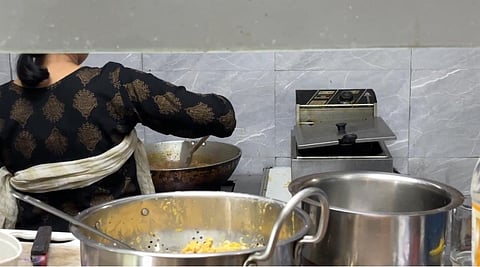

In India’s capital, where cultures from across the country converge, what you eat can quietly determine where you belong.
For many migrants from the Northeast, beef isn’t just a dish; it’s a reminder of home. But in Delhi, where cattle slaughter is banned and cow protection vigilantes still pose a threat, this food identity often comes with discomfort, silence, and judgment.
Conversations around beef remain fraught, especially for those from communities where it is an accepted norm. The young people from the Northeast in Delhi navigate this reality in different ways. Some stay silent. Some speak up. Others adapt. But all carry within them the quiet tension of being different in a city that often demands conformity.
“I just don’t bring it up”
For Toko Rija, discretion is not about shame, it’s about survival. “I don’t recall facing direct discrimination because I choose not to talk about eating beef at all,” she says. “Especially not with non-tribal, ‘mainlander’ friends who have openly right-wing leaning or practising Hindus.” Her choice is shaped by caution and by videos she’s seen of Northeastern and Muslim people being harassed for eating meat. “The judgment I face has already been internalised.”
Zuiner Jamir from Nagaland echoes this quiet caution. “I feel uncomfortable speaking about eating beef, so I rarely bring it up. I haven’t faced judgment, but maybe that’s because I’ve avoided the topic altogether.”
For others like Gandhi Riyang, who doesn’t eat beef due to cultural reasons, the silence runs deeper. “I don’t face discrimination, but my identity still gets misunderstood. People thrust ‘Buddhist upper-caste’ tags onto me. Food habits vary even within the Northeast, but in Delhi, those nuances are invisible.”
“It’s my culture—deal with it”
Lenyin Taggu, a law student from Arunachal Pradesh, prefers honesty over hesitation. “I’ve talked about beef, debated it. Some people are uncomfortable; others eventually accept it. And to those who try to shame me. I remind them: you don’t get to force your beliefs on others.”
Yumlam Kamin, who has been in Delhi for over a decade, says he’s always been open about his food. “I’ve made beef for friends back in school. They liked it. One even used to call it ‘yamter laado,’ though he couldn’t eat it at home and missed it.”
But speaking up isn’t always without cost. Pimbhi Mepo recalls being embarrassed after casually mentioning beef in class. “I saw discomfort in their eyes. One person later told me not to talk about beef openly. I was told it might offend people. I was shocked. I wasn’t saying anything offensive. Just sharing my food culture.”
For her, the issue cuts to the core of what it means to live in a democracy. “No one should dictate food habits. We differ; therefore, we are Indian.”
Several respondents said they haven’t eaten beef in Delhi not out of fear, but practicality or personal taste. “I haven’t cooked beef here,” says Lenyin, “but not because I’m ashamed. I’ve just been too lazy to cook non-veg. And if you’re going to make non-veg, it better taste like heaven. Otherwise, why bother?”
Toko Rija admits that beef has never been a major part of her diet. “I prefer chicken and pork. So I haven’t felt its absence.” Zuiner too feels that access to other meats softens the impact.
“In Arunachal, you see rice hotels and beef butchers openly,” says Gandhi Riyang. “In Delhi, that visibility disappears.”
Power, Prejudice, and Pluralism
For some, the issue of beef goes beyond food. It touches on secularism, caste, and power. “The beef ban is about appeasing dominant sentiments at the cost of others’ rights,” Toko argues. “It violates the spirit of secularism.”
Gandhi brings a caste lens into the picture. “Beef is eaten by Dalit communities too, like the SC Mangs of Marathwada. Even among Hindus, there’s diversity in diets. But in Delhi, you don’t see that reflected. Visibility matters.”
These reflections reveal how a basic thing like food and food habits becomes a stand-in for larger questions about identity, acceptance, and whose culture gets to be visible, let alone validated.
“We Differ, Therefore We Are Indian”
In a city that promises opportunity but often demands assimilation, food becomes a quiet battleground. For many from the Northeast, eating, or not eating, beef is rarely just a dietary choice. It is shaped by fear, habit, solidarity, and resistance.
Pimbhi’s words sum it up: “We live in a democratic country. One should have the liberty to choose their food without fearing repercussions. We differ. Therefore, we are Indian.”
Have you liked the news article?